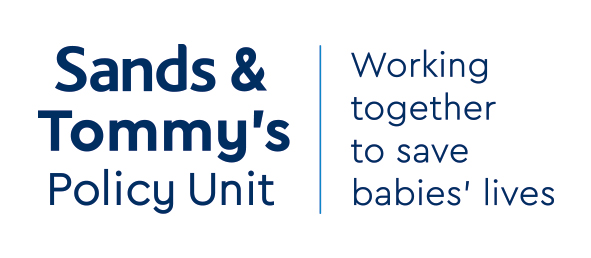Government action to improve maternity and neonatal services in Wales is not enough to drive the ‘transformative change’ needed to save babies’ lives, say leading pregnancy charities.
A report published today (14 May) by the Sands and Tommy’s Joint Policy Unit says progress towards reducing stillbirths and neonatal deaths has stalled in Wales and across the UK.
The Saving Babies’ Lives 2024: Progress Report says the current scale of pregnancy loss and baby deaths in the UK is ‘not inevitable’.1
The report estimates that with better care at least 800 babies’ lives may have been saved across the UK last year, and says ‘meaningful action’ is needed to address ‘stark and persistent inequalities’ between rates of baby loss and pregnancy complications among different groups.
It also highlights ongoing differences in outcomes for babies from different ethnic backgrounds, and between those from the most and least deprived areas of the UK.
Wales lagging behind the rest of the UK on saving babies’ lives
The stillbirth rate in Wales has been higher than any other UK nation since 2014, and there has been little progress on reducing rates of neonatal mortality over the last 10 years.2&3
Although there is an ambition in England to halve rates of stillbirth, neonatal death, preterm birth, maternal death and brain injury by 2025, relative to 2010, there is no equivalent ambition in Wales.
The report also highlights that fewer reviews are completed in Wales following the death of a baby compared to the rest of the UK. These reviews are vital in understanding whether anything could be learned that could save babies’ lives in the future, and for parents to get answers to their questions about why their baby died.
Robert Wilson, head of the Sands and Tommy’s Joint Policy Unit, said: “Our report makes clear that the Welsh Government must commit to targets for reducing pregnancy loss and baby deaths and eliminating inequalities. These targets should be the driving force behind a comprehensive programme of policy activity, with the funding and resources this needs.
“So many recent reports have underlined the need to improve the quality and safety of maternity and neonatal services. In the absence of evidence to the contrary, we believe that these issues are as relevant in Wales as the rest of the UK, and the Welsh Government should do everything in its power to tackle these issues and save babies’ lives.”
The Joint Policy Unit report makes specific recommendations to improve maternity safety in Wales, which include:
- Regularly and consistently asking staff and patients – particularly bereaved parents – about their experience of maternity and neonatal services in Wales.
- That any reviews of individual maternity/neonatal services in Wales should involve families from the outset, ensure a transparent process, and include independent oversight.
- Improving the completion rate for reviews following the death of a baby.
The Sands and Tommy’s Joint Policy Unit is calling on all four UK nations to make a clear commitment to eliminating inequalities in pregnancy and baby loss.
In 2021, the rate of both stillbirths and neonatal deaths among Black babies was almost double the rate among White babies and double that of the overall rate in the UK. The rate of stillbirths in the most deprived areas of the UK was double that in the least deprived areas.
The proportion of public and charity funding for health-related research which is spent on reproductive health and childbirth has remained at around 2% for the last 20 years.
Ends
Contact info
The linked text above will take readers to the report once it has been published. To request an advance copy of the report under embargo, or to arrange to speak to Robert Wilson or a Sands spokesperson, please contact Adrian Brown in Sands’ press office via media@sands.org.uk or 07748 047337.
To speak to a Tommy’s spokesperson please contact Polly Newton in Tommy’s press office via tommyspressoffice@tommys.org or 07955 428759.
Notes to editors
- The Saving Babies’ Lives 2024 Progress report brings together data on pregnancy and baby loss across the UK and assesses progress to save more babies’ lives and reduce inequalities. Health is a devolved matter, with policies, funding and the healthcare system overseen by devolved governments in each of the four nations. While each nation faces similar systemic issues, much of the data are reported separately.
- The stillbirth rate in Wales has been higher than any other UK nation since 2014. The stillbirth rate in England declined steadily between 2010 and 2022 (a 24% reduction), although it increased again in 2021. Stillbirth rates also declined overall between 2010 and 2022 in Wales (-17%), Northern Ireland (-17%) and Scotland (-24%). However, the rates are more variable year-on-year compared to England, which may partly reflect the smaller populations.
- In 2021, Wales had the lowest neonatal mortality rate; however, the increase in the rate between 2016 and 2019 was not reflected in other nations. Like the stillbirth rate, there is high year-on-year volatility in the data for Wales, Northern Ireland, and Scotland due to the smaller population sizes. Using three-year average rates to reduce some of this variation shows that neonatal mortality rates increased slightly (+2.4%) in Wales between 2010-12 and 2019-21, while they declined in Scotland (-10.1%) and England (5.8%). The three-year average neonatal mortality rate for Wales was also the second highest out of the four nations in 2019-21 (2.8 per 1,000).
About the Sands & Tommy’s Joint Policy Unit
In 2022 the charities Sands and Tommy’s came together to form a Joint Policy Unit. Together we are focussed on achieving policy change that will save more babies’ lives during pregnancy and the neonatal period and on tackling inequalities in loss, so that everyone can benefit from the best possible outcomes.

| [donate]
| Help keep news FREE for our readersSupporting your local community newspaper/online news outlet is crucial now more than ever. If you believe in independent journalism,then consider making a valuable contribution by making a one-time or monthly donation. We operate in rural areas where providing unbiased news can be challenging. |

















